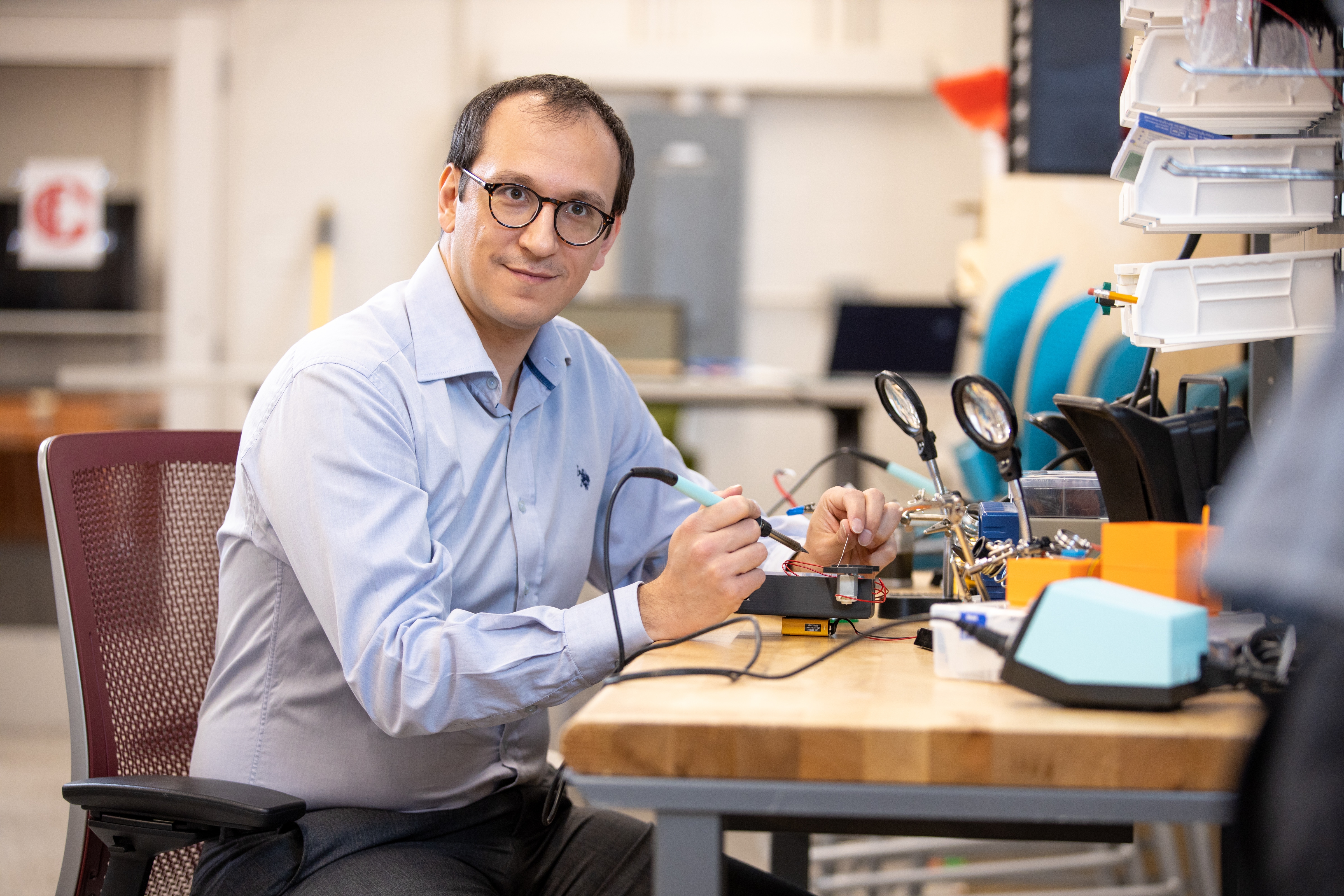Alkan Soysal: Launching Autonomous Students and Networks

Introducing Alkan Soysal
- Joined ECE August 2019
- Visiting associate professor, University of Maryland, College Park, 2018-2019
- Assistant then associate professor, Bahcesehir University, Istanbul, Turkey, 2008-2018
- Ph.D., electrical engineering, University of Maryland, College Park, 2008
- M.S., electrical engineering, University of Maryland, College Park, 2006
Launching Autonomous Students and Networks
A team of freshmen is designing flying taxis in Hillcrest Hall’s Discovery Studio. They are considering every aspect of their product—from its engineering to its aesthetics to its social impact. Alkan Soysal, who joined ECE last fall as Boeing Collegiate Associate Professor, is teaching and mentoring the students, who are participating in the Calhoun Discovery Program.
This program, which was funded with a gift from David Calhoun (’79), is run through the Honors College. It brings undergraduates from many disciplines, including ECE, Computational Modeling and Data Analytics (CMDA), environmental policy, art, and communications, together to collaborate on studio projects suggested by corporate sponsors. These sponsors—including Boeing, Caterpillar, and GE—check in with the teams and offer feedback throughout the semester.
Admitted to the program as freshmen, the students receive scholarships covering four years of tuition, and a $10,000 experiential learning grant. The program welcomed its first class of 40 freshmen, 12 of whom are ECE majors, in fall 2019. They began working on their studio projects immediately. “They will do this almost every semester until they graduate. Six out of eight semesters, they will have studios,” says Soysal.
His role is to help the ECE students fulfill their requirements within the department and the Calhoun Discovery Program, while pursuing their research and professional interests. He also teaches ECE fundamentals to students from other disciplines. “This jargon is flying around in the team,” he explains, “They need to know how a circuit works and what an algorithm is, so that they can follow the discussion.”
In the technology industry, Soysal points out, people from different departments—engineering, marketing, and legal for example—work together on product development. The Calhoun Discovery Program puts undergraduates in a similar interdisciplinary, goal-oriented environment from the moment they set foot on campus. Eventually, the program will create small-scale production lines for students to gain experience with manufacturing processes.
“I am creating connections between the ECE department and the Honors College,” Soysal explains. He wants to involve more ECE faculty members in the Calhoun Discovery Program, noting that “we’re moving towards highly engineered systems.” He also stresses the educational value of these types of teams: “We work on an entire system focused around an engineering problem. We need other people or other processes in the system, not just engineers.”
A Background in Self-Optimizing Wireless Networks
Soysal, who specializes in wireless communications, can draw on his experience with research and development to advise his students.
After completing his Ph.D. at the University of Maryland, College Park, he joined the faculty of the Department of Electrical and Electronics Engineering at Bahcesehir University in Istanbul, where he founded the Intel Future Technologies Lab.
There, he developed algorithms to help 3G and LTE networks self-optimize their performance by shifting loads and turning off unneeded carriers for energy efficiency and cost savings. The project was supported by Ericsson and the leading telecommunications operator in Turkey, Turkcell.
In 2018, Soysal returned to the United States as a Visiting Associate Professor at the University of Maryland, College Park, where he developed algorithms to improve network operation by minimizing the age of information at the receiver.
His research on optimizing latency will help wireless networks prioritize transmitting and processing the most recent and urgent information. Typically, networks queue information and deliver it in the order received, regardless of delays. But what if a device needs only the most up-to-date information? It is far more important for an autonomous car to communicate its location right now, than to send information about where it was a few seconds ago. The most recent location data needs to be transmitted and processed first.
Similarly, it might be useful to transmit a car’s fluid level readings to other vehicles, but the information being sent about its speed and location should obviously take precedence. Soysal’s algorithms will help Internet of Things devices optimize latency by independently deciding how to prioritize information according to its situational relevance.


